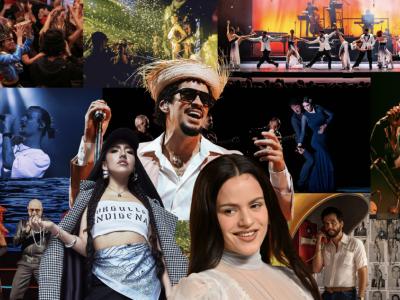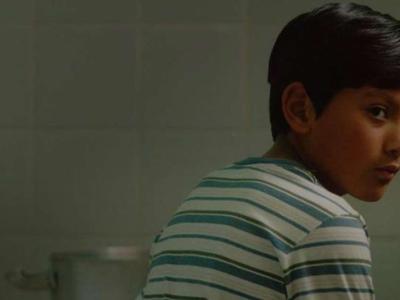“I think I’m a little diva. My personality is very extra. When it comes to a show, I love the glitter,” confesses Lucy Calcines.
This was startlingly obvious when the Cuban-Spanish singer appeared on British prime-time TV back in 2020. With the first belt of her voice, from deep in her lungs as she launched into J Balvin’s Mi Gente, Will.I.am’s eyes practically popped out of his head. Without hesitation, the US music mogul pressed his button (he gets it), Lucy’s face lit up and she was off, in star mode, hyping the crowd and giving all four judges no choice but to turn their chairs.
That single performance on The Voice UK became the most streamed of the series. Fast forward three years, post-pandemic, and 32 million views later, Lucy appeared at LatinoLife in the Park 2nd stage, grabbed the microphone and launched into a medley of the songs from another Latin diva, the late Tejana singer Selena Quintanilla. The crowd immediately reacted, both to Lucy’s incredible vocals and to the iconic songs such as como la flor, that they had been brought up with. Bringing back memories of their childhood, igniting pride in their heritage, they all sang along; English audience members stunned and delighted at the spectacle. Taking us all by surprise, Lucy’s performance naturally led to the idea of a tribute the great women of Latin music; this diva clearly had the chops and the charisma to take on the challenge. Lucy Calcines demands the stage, and so the stage is given
Lucy was born in Gran Canaria, Spain after her Cuban parents migrated there. Her father, a classical tenor singer, who also sang traditional Cuban music and plays the guitar. Her mother, also a performer: “Her thing was 80s music like Whitney Houston. In fact, she used to play lots of R&B in the house. This helped me influence the style of music I wanted to do.”
Lucy knew from a very young age that she was meant to be an artist. “I don't really remember a time when I wasn’t singing. I watched my parents on stage since I was very little. I loved seeing them perform,” she says. “I didn’t have the best time at school. As a Latina who was very artsy, outgoing and liked to dress up, I was a bit of an outcast from Spanish society. I didn't really fit in. Canaria is a little town and everyone is very quiet. I used to get a lot of criticism because I was an extrovert.”
In 2015 Lucy decided to come to London to study music business and management at Middlesex University. “I wanted to gain knowledge about the industry so I could navigate it better and also to be able to manage my own career. If I stayed in Spain, I would have just kept doing the same. Going to London meant having more opportunities.” Strangely, it was in London that Lucy became involved with the Latin community and Latin music. “In Spain, the Latino communities don’t really stick together. In London, I started to discover what was going on with the Latin scene, and it really helped me a lot. I learned how big the community is. But my god, so many Colombians live in London!” Lucy recalls.
Releasing her debut song, ‘Ain't Got Time’, which received 96,000 views, Lucy dedicated her time to posting her work on YouTube and Instagram. One day, a producer from The Voice UK got in touch with her. “At first, I was a little hesitant because I had already tried out for The X Factor and didn't really enjoy the experience. I assumed it would be similar, but I still decided to go ahead because I wanted to believe it could be a positive experience. And that's when crazy stuff started to happen.”
After her audition which garnered a phenomenal 32 million, she chose to collaborate with Will.i.am, who characterised her as “a rare specimen and someone that comes around every once in a while.’ The Black Eyed Peas frontman assisted Lucy in developing her own sense of style, organisation and voice. “He said that I need to have a tangible product. I need to be more specific on what I want when I'm creating a song.”
Not long after her first few weeks on the show, COVID hit and the show was indefinitely postponed. “That was honestly horrible. I'm not going to lie. It was one of the worst experiences of my life. I got to a very low point psychologically. It was really hard to go through those times because my career was beginning to grow and then everything stopped.”
Despite her many challenges, after a while Lucy began to focus on her work and making new songs. She began looking for inspiration in other styles of music that were popping around the world. “I can honestly say that BTS and K-pop saved my life!” she laughs. “What they were doing and the concepts they used inspired me musically.”
During this time, Lucy also realised that reggaetón, which is what every Latin artist is expected to do, wasn’t for her. “The genre has become very commercialised and repetitive. It doesn't feel authentic, I love my Latin music, but I began to look to iconic female artists like Selena, JLO, or Gloria Estefan whose paths I identified more with.”
Principally, Lucy points out, all these artists, along with La India and to a lesser extent Celia Cruz, have made their careers as immigrants: they were the first cross over artists and paved the way for others to come. “As immigrants they had to adapt and change, drawing on influences from around them while obviously being rooted in a very strong musical culture of their own. Selena's parents were Mexican, but she was born in Texas, and came back to Latin music later. Growing up as an immigrant, your first instinct is to want to belong to the society you grow up in. But then you appreciate later that you have another unique culture to draw on, that kicks in later on.”
Lucy began to watch lots of videos of Selena. “I learnt how to talk with the audience by just watching her shows, as she had a particular way of connecting with her fans,” she says of the star who was murdered at the height of her fame, ironically, by the manager of her fan club. “I see a lot of myself in Selena. She helped me to show my vibe more on stage and to be able to connect with people because, believe it or not, I'm really shy.”
Jenifer Lopez is another inspiration. “I didn't grow up listening to a lot of Latin music, but I did listen to J-Lo,” she says of the daughter of Puerto Rican immigrants who went on to become the biggest Latina star on the planet and the epitome of the American dream, singing at Joe Biden’s inauguration. “Again, she made her name in hip-hop and R&B, before really having the confidence to reveal her Latin identity. She's an actress, singer, and dancer, and that's actually something I want to do as well.”
A tribute to great Latina divas wouldn’t be complete without the ultimate salsa goddess, Celia Cruz, who popularised tropical rhythms and became one of the biggest symbol of Latin music from the 1960s, when she left Cuba, to when she died in 2003.
“I identify with her because I've always felt very Cuban because both of my parents are Cuban, and it's just something that I've always had within me. As I get older, I have started listening to more Cuban music and obviously it’s an inspiration to see such a successful Cuban woman and how she relished her Cuban-ness. I feel like I've taken that from her and then from Gloria Estefan, another Cuban diva who dominated the stages in the United States.”
Gloria Estefan arrived in America at a very young age and settled in Miami. After meeting her lifelong part Emilio, she began singing in his band The Miami Sound Machine. But it was clear Gloria was the star and Emilio made her so. Like Selena and J-Lo, Gloria also went back to her Latin roots after becoming a popstar. Her third studio album as a solo artist Mi Tierra sold over five million copies worldwide in 1993 and was the first record to reach number one on the newly created Billboard Top Latin Albums.
“I admire Gloria because she continued to honour her Latin heritage while being a global star in English. And also want to do both,” says Lucy. “I think we don't really have Latin divas like that anymore because urban music has taken over. I kind of miss the elegance that they used to have. For me La India is the ultimate Latin Diva; she’s one of the best Latina vocalists ever and her songs are perfect to get over a heartbreak!”
Lucy and her team are now preparing a unique show that pays tribute to these amazing women, as well as singing her own songs. It’s quite a challenge she admits. "I love it because it's the first time that I'm actually performing with a live band, and I just love the energy around the musicians. There’ll also be few surprises, like my mom's coming to sing with me! I think it's going to be a really fun show." Indeed, now the big girl, who still looks like a baby, has her stage to show the diva that she is.















